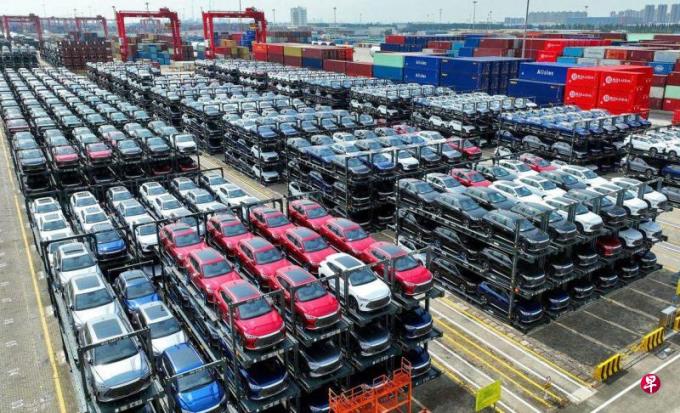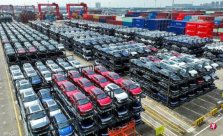
(Tokyo/Shanghai/Beijing Comprehensive News) China ’s automobile exports have maintained a high -speed growth trend in recent years. In 2023, automobile exports are expected to surpass Japan and become the world’ s largest exporter in the world for the first time.
Comprehensive Japan Kyodo News and First Financial Network reported that the Japanese Automobile Industry Club announced on Thursday (December 28) that from January to November, Japan's automobile exports were 3.99 million.
The China Automobile Industry Association announced earlier data showing that the export volume of China during the same period was 4.412 million, a year -on -year increase of 58.4%.Based on this, China's automobile exports have exceeded Japan this year, and they have jumped to the world's first.
China Automobile Export has grown rapidly in the past three years.Before 2020, the export volume has been maintained at about 1 million years for many years; since 2021, it has increased rapidly to 2015,000, and in 2022 to 3.111 million, surpassing Germany ranked second in the world, and continued to surpass Japan this year.
Traditional fuel vehicles are still the main force of Chinese cars, but new energy vehicles such as pure electric vehicles are the core growth point of exports.With the vigorous promotion and support of the Chinese government in recent years, Chinese auto manufacturers have increased R & D and investment layouts, and achieved low -cost and high -performance new energy vehicle export growth.From January to June this year, China exported 800,000 new energy vehicles, an increase of 105%year -on -year.
In terms of export market, Russia, Mexico, and Belgium are the top three countries in China in the first half of the year. Among them, Russia is one of the important growth points of Chinese automobile exports.
Since the conflict between Russia and Ukraine, many Japanese and European and American car companies have announced their withdrawal from the Russian market, and Chinese car companies have filled some market vacancies.According to data from the China Passenger Car Market Information Joint Information, in the first half of this year, China ’s car exports to Russia exceeded 370,000, a significant increase of 622%year -on -year.
Exports to the European market have also grown rapidly.In the first half of the year, China ’s exports of cars in Europe accounted for the total export of vehicles, rising from 5.7%in 2018 to 39.1%.
In addition, Chinese car companies have also continuously expanded their exports to markets such as Southeast Asia, Australia, South America.
From the perspective of different automotive fields, China's new energy vehicles are mainly exported to Europe and Southeast Asia.According to statistics from the China Automobile Industry Association, the top three countries in China's new energy vehicle exports in the first half of the year are Belgium, Britain and Thailand.Chinese fuel vehicles are mainly exported to developing countries and regions, of which Russia is a source of market increasing.
Shanghai Automobile Group, Chery, Tesla and Changan are the four major car companies in the car export.In the first half of this year, SAIC Group exported 483,000 vehicles, 394,000 vehicles exported to Chery, 182,000 vehicles exported to Tesla, and 178,000 vehicles exported to Changan.
Chinese car companies with large exports include Great Wall, Geely, Dongfeng, Jiangqi, BYD, Beijing Automobile Group, etc.
In terms of specific models, the export volume of MG ZS, a subsidiary of SAIC Group, ranks first among various brands. In the first half of the year, it sold 115,000 units in Europe, an increase of 143%year -on -year.In addition, the Model Y medium -sized SUV and Tesla Model 3 produced by Tesla Shanghai are the top models of exports.
According to Bloomberg, mainland China electric vehicle manufacturers have opened offices in Hong Kong to use the global expansion of the Hong Kong financial system.According to data from Hong Kong's introduction of key enterprise office, so far, mainland electric vehicle -related enterprises have promised to invest 8.6 billion Hong Kong dollars (S $ 1.4 billion), and plans to hire 1,300 employees in Hong Kong.
Ningde, the world's largest battery manufacturer, announced earlier this month that it is planned to set up an international headquarters in Hong Kong with a plan to scold about HK $ 1.2 billion (S $ 200 million) to hire a total of 500 people.
However, Chinese cars still face many challenges.The Global Times quoted expert analysis that international car companies have accumulated decades of advantages in the marketing system, brand power, and after -sales system. It is difficult for Chinese car companies to reduce these objective gaps in the short term.
In addition, the challenges faced by Chinese car companies also include how to build a complete industrial chain from "exporting" to "going to the sea", and build a complete industrial chain in overseas markets.



